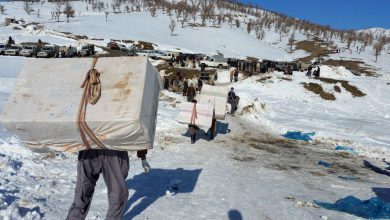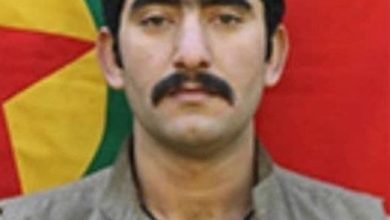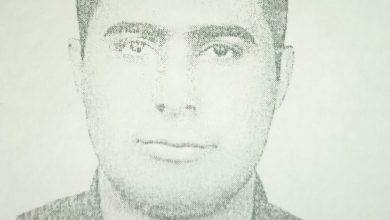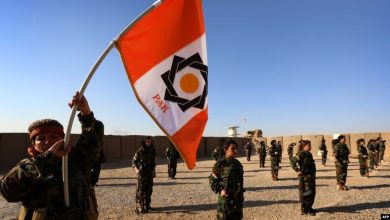Evin Nadri Danani is one of the dozens of Iranian Kurdish girls who were lured by PJAK’s false promises of “freedom and equality” and never returned. With eyes weary from waiting, her father speaks of the days he believed in PJAK, leaving him now with nothing but regret and silence.
Evin Nadri Danani, a teenage girl from Kamyaran, is another silent victim of the PJAK armed group’s policy of deception and indoctrination. Evin was an 11th-grade Humanities student who had simple dreams of education, progress, and a better life. However, these very dreams, set against a backdrop of poverty and vulnerability, became tools for exploitation. October 2021, the moment she left home forever and never returned, marked the beginning of a nightmare for a family that has been silently gazing at the door ever since.
Over the past few years, the armed PJAK group, the Iranian wing of the Kurdistan Workers’ Party (PKK), has exploited social media and weak oversight in border regions to deceive hundreds of Iranian adolescents with the pretext of “fighting for Kurdish freedom” and transferred them to its bases in the Kurdistan Region of Iraq. Ostensibly, they speak of liberty, equality, and human dignity, but in practice, they drag children and teenagers into ideological servitude and war. Evin is just one of these victims—a girl from an underprivileged background whose hope for the future was stolen by false promises.
Psychological analysis of this phenomenon shows that adolescents, especially in societies with closed structures and limited opportunities, are more vulnerable to mental manipulation. Feelings of loneliness, the need for visibility, the desire for meaning, and the fervor for justice peak during adolescence. Groups like PJAK precisely target these emotional vulnerabilities. Their propaganda on social media is designed with emotional language and full of symbols of freedom and resistance. In the adolescent mind, these images are not signs of violence but a romanticized picture of heroism and individual independence. Furthermore, family poverty and a lack of intergenerational dialogue render parental warnings ineffective.
On a sociological level, Evin Nadri’s case reflects a broader crisis. Iran’s Kurdish regions are grappling with chronic deprivations and structural neglect. In such an environment, armed groups fill the void left by official institutions by promising education, refuge, and social equality. The reality, however, is that PJAK has no solution for development nor a genuine program for freedom; it is merely a tool for consuming young human resources in an exhausting and endless political project.
Evin’s father, Taimour Nadri, recounts his story with a strained voice and tired eyes:
“Evin was a quiet, kind, and intelligent girl. She always said she wanted to study hard to become someone in the future. She was an honor student from elementary school, and all her teachers loved her. My only wish was for her to continue her education and have a better future than ours. We are a poor family; I am a seasonal laborer, working only a few months a year and unemployed the rest of the time. Despite this, I tried not to let her feel any shortage. I even bought her a phone with borrowed money so she could follow her lessons. I never thought that same phone would become the gateway to hell for us.
For a while, Evin’s behavior changed. She stayed up later at night, talked on the phone, and quickly hid it when we entered the room. At first, I thought she had found a friend, but later I noticed the tone of her conversations had changed; she started talking about oppression, tyranny, and the freedom of the Kurds. These were not her own words. One day, I accidentally saw her social media page—it was full of pictures of women in military uniforms in the mountains. Right then, I knew Evin was in danger. I talked to her, advised her, and even cried, telling her these paths lead nowhere, but she wouldn’t listen. She said that there, everyone is equal, everyone is free, and no one forces girls to do anything.
It was October 2021. She got ready for school as usual in the morning. She said she had to leave early for an extra class. She never came back. We waited until night, then called the school; they said she hadn’t shown up at all that day. At that moment, I realized the situation was serious. We talked to her friends, who said she had been talking a lot to a girl on Instagram for a few days, apparently from Iraq. We informed the police, but nothing was found. After a few weeks, we received a brief call from an unknown number. It was Evin’s voice; she said, ‘Dad, don’t worry, I’m fine, I’m fighting for my people’s freedom here.’ Before I could speak, the call was cut off. That night, I realized they had tricked her and taken her across the border.
I tried several times to go to the Kurdistan Region, but travel was very difficult for us. Firstly, we had no money, and secondly, I didn’t have a passport. After a few months, one of our acquaintances went to Sulaymaniyah, and I begged him to find news of my daughter. He inquired at the camps; everywhere he went, they either lied or were afraid to answer. One person there even told him that he had seen Evin at one of PJAK’s bases but was not allowed to speak with her. After two days, that man disappeared, and my friend couldn’t find him anymore. They told him that if he asked too many questions, he would be taken himself. That’s when we realized what kind of movement we were dealing with; these are neither political groups nor defenders of the people—they are just hunters, especially of girls and teenagers.
We no longer have peace. Her mother hasn’t slept a full night since that day. Every time we hear in the news that one of PJAK’s forces has been killed, our breath catches. We are afraid Evin’s name might be among them. We have no contact from her, no letter, no message. The only things left are her school pictures that we look at every night. Our house has become silent and cold; every corner reminds us of Evin.
With the help of a friend and legal consultant, we have filed a complaint against PJAK leaders. Our demand is clear: accountability and the release of our daughter. We have no political affiliations; we are just parents whose child has been abducted. These groups must answer why they permit themselves to deceive children through social media.
If I saw Evin now, I would only say: Evin, come back. Nothing is worth destroying your life for. We are dead without you; we are just walking. Nothing is left for us in this world but the hope of seeing you again.”
The father’s narrative is not only a reflection of one family’s suffering but also a mirror of a deep social crisis in the border regions. PJAK, under the guise of struggle, exploits emotional, educational, and economic voids. This group is not only built upon a belief in violence and hatred of the other but also psychologically plunges its members into a cycle of identity fragmentation and mental isolation. Girls who are seemingly invited to ‘liberation’ are, in fact, dispossessed of their bodies and wills, becoming propaganda assets in mountainous camps.
In political analysis, the story of Evin Nadri is a sign of the continuing strategy of Kurdish armed groups who, in the absence of official accountability and social development, use adolescents as a tool for ideological reproduction. What is outwardly called the ‘Ideal of Freedom’ is actually a political project for the survival of an obsolete military structure that cannot continue except by deceiving the new generation.
The case of Evin Nadri today symbolizes a larger question: How many more Evins are lost in these mountains, and how many more families speak to their child’s picture in the silence of the night? How long will the international community, organizations claiming to defend human rights, and even international media, remain silent in the face of this manifest crime against the children of Iranian Kurdistan?
Iranian Kurdistan Human Rights Watch supports the Nadri family and other similar families, urging the United Nations, the Committee on the Rights of the Child, and the Government of the Kurdistan Region to conduct an independent and immediate investigation into the fate of Evin and the other disappeared girls in PJAK camps. What has been lost is not just a girl; it is the hope of a generation that should be building the future, not sacrificing itself in the mountains of war for the lie of freedom.






